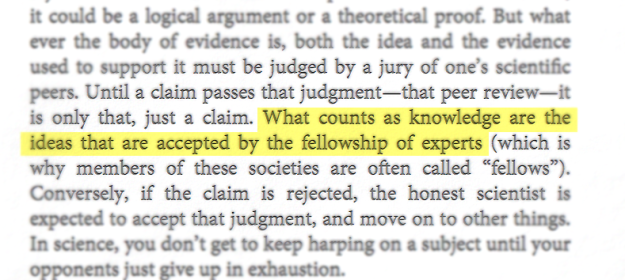Here’s the long-awaited followup to Part 1: The history of the Climate Debate from 1850 -2008, where history is tragedy reënacted as comedy, adapted for irony and syndicated as sarcasm. By Brad Keyes from Climate Nuremberg (whose motto is Deride And Conquer). — Jo
Guest Post by Brad Keyes
2009
- Documents liberated in the so-called Climategate leaks don’t show any impropriety on The Scientists’™ part whatsoever, which is why 19 independent inquiries are held to make sure.*
- Glaciergate happens
- Using nothing but schoolboy logic and denier logic, voodoo scientists identify a false prediction in IPCC AR4.
- Citing something called the scientific method, fundamentalist Feynmanites point out that if the IPCC’s prediction was wrong, its hypothesis must be wrong.
- Jubilation worldwide as the Intergovernmental Panel decides to hold onto its apocalyptic hypothesis anyway.
- After a lifetime questioning the claims of pea-thimbling ghost-realtors, evolution-denying WMD-existers, telekinetic psychopaths and telepathic psychokines, James Randi suddenly turns his back on everything Skepticism stands for by questioning The Science™. Skeptic authorities take the 87-year-old legend aside for a quiet chat about CAGW and, 24 hours later, Randi has freely accepted how silly he was to doubt something so rock-solid that no other Skeptic with a capital S even feels the need to examine it.
*Independent of each other, not of the Climate Research Unit in question.**
**Independent in a poetic, not a legal, procedural, or quote-unquote ‘actual,’ sense.
2010
- Climatologist Will Steffen simply tells PM Gillard to “Make tax hurt”—yet within hours, skeptics have somehow politicized his science.
- With the complicity of fellow fabulists, Prof. David Karoly concocts the meme that skeptics are waging a “relentless campaign of death threats” against scientists. If journalists are gullible enough to parrot this libel, then maybe, just maybe, the public will finally see why you can’t trust skeptics.

There is “real, physical evidence” that our atmosphere is in crisis, Prof. David Karoly reassures demoralised students. And scientists would love to reveal what it is, he says—if only someone hadn’t put a rat on Ben Santer’s doorstep in 1996. The resulting climate of fear (no pun intended) has condemned a generation of honest researchers to silence, euphemism and self-censorship.
- Motley CRU rehabilitated
- Desperate to restore trust in British climate science, between 7 and “dozens” of official exonerations are launched into the non-consensually leaked material from the UEA: the private publicly-funded data; the private work-related emails; private conversations between anonymous peer reviewers; private admissions that Steve McIntyre “has a point”; etc., etc.
- A “trick to hide the decline” is explained away when investigators learn that trick, to, the, decline are perfectly normal science words.
- The consensus on a particularly infamous email, in which CRU boss Phil Jones appears to celebrate the death of a skeptical scientist, is that it was an appalling choice of medium.
- With the single caveat that “the science was not the subject of our study,” the Science Appraisal Panel declares the science sound.
- Even more reassuring to the public, though, is the finding that Prof. Jones may have been secretive and unhelpful, “but that was true of all the climate scientists.”
- Journalist Donna LaFramboise is thumbing through IPCC AR4 one morning when she spots an embarrassing oversight: 5,587 non-peer-reviewed citations.
- When AmazonGates Attack, Part 1: He Never Signed Up For This
- Dana Nuccitelli is a successful environmentologist with the whole world at his feet, but deep down, all he ever wanted to be was a psychic book reviewer. So he can’t resist posting a one-star prefutation of Andrew Montford’s Hockey Stick Illusion, prebutting what he previsions as the “misinformation, lies, and nonsense” that presumably comprise the “work of science fiction.”
- Like a good scientist, Nuccitelli is careful not to defame Montford in more detail than his own limited imagination can support. The last thing he expects is for other Amazon customers to use this virtue against him, teasing him mercilessly over his vague, hand-wavy hatchet-job.
- SkSFührer John Cook chides Dana for taking it personally when skeptics demand that he “read the book, Nutticelli [sic]” or “be honest for once!” This tactic—Impossible Expectations—is just a Characteristic of Denial, explains Cook; and he ought to know, having literally written the book on rejecting reality.
- Even in antisemitic circles, the Oreskes/Conway conspiracy yawner Merchants of Doubt has few fans until it’s ingeniously re-released as non-fiction.

Taken from Chapter 4, this long-overdue correction to millennia of Western epistemology is one of several gems in Merchants of Doubt. Everyone from Aristotle onwards has made the mistake of thinking knowledge meant justified true belief. Simply by dropping the ‘truth’ requirement, Oreskes and Conway usher in a golden age of human ‘knowledge’ about climate change.
2011
- The Müller’s Tale
- The press is calling Prof Richard Müller a converted skeptic, after he asks the press to “call me a converted skeptic.” It’s the ultimate Man Bites Dog data point! For reasons not yet understood, scientists who are born believing inevitably become more skeptical the more they examine the evidence. Yet Prof. Müller seems to have gone the other way, overturning a law of nature. It would be unethical for science journalists to waste time fact-checking such an historic scoop.
- The press is calling Prof Richard Müller a converted skeptic, after he asks the press to “call me a converted skeptic.” It’s the ultimate Man Bites Dog data point! For reasons not yet understood, scientists who are born believing inevitably become more skeptical the more they examine the evidence. Yet Prof. Müller seems to have gone the other way, overturning a law of nature. It would be unethical for science journalists to waste time fact-checking such an historic scoop.
- It’s worse than anyone thought logically possible!
- Professor Will Steffen uses Australian television to break the news that’s too terrifying for the peer-reviewed literature: far from pausing, announces the popular Klimakommissar, the effects of climate change are actually happening faster than anyone dared dream, in just about every metric except temperature.
- The implications are disturbing: if this is what global warming is capable of now, what horrors would it produce if the globe was actually warming?

With a PhD in chemical engineering, Prof. Steffen [left] is obviously one of our top climate scientists—second only in climato-credibility to former Australian Gillard Government Climate Commission Chief Commissioner Distinguished Panasonic Sustainability Chair Professor Timothy J. Flannery, PhD, the zoologist who’s forgotten more about ancient wombat stride lengths than most people will ever know [right]. (Glamor shots courtesy of ScaredScientists, the website so scared, it’s too scared to exist anymore.)
- Cheering news, in an odd way, with the unveiling of Climategate 2.0. The cyberterrorists known only as FOIA have been busy, carefully selecting the one or two thousand emails that look bad when seen out of context.
- Senator Barbara Boxer speaks truth to power
- A visibly-rational Sen. Boxer (D), her voice choking with data, treats US lawmakers to a lecture on the paediatric health impacts of 400 ppm CO2 in the atmosphere, drawing compelling links to the recent pandemic of schoolkids asphyxiating without warning. Boxer’s science wins a standing ovation from an overwhelmingly pro-evidence Senate. But will it be enough to put a dent in the complete denial of these issues by America’s moms, dads, scientists and doctors?
- What’s my ‘cene?
- For the first time since the Big Bang, mankind is literally capable of altering the very objects around him, argue an increasing number of experts.
- Geologians agree, and believe—by razor-thin consensus—that this will cause a new layer of rocks to begin sometime this weekend.
- As a reminder that attributing natural events to nature is now considered a form of denial, the new epoch will be named the Anthropocene (or supernatural) age, announces ANU climatologist Will Steffen.
- Basically on schedule, the Holocene comes to an end at lunchtime [AEST] the following Tuesday. Within minutes, the planet returns to conditions not cene since the dawn of the Scientific, over 300 years ago.
- Climate scientists are calling today’s milestone ‘the end of an era.’
- Scientists, meanwhile, have described it as ‘the start of an error.’
When AmazonGates Attack, Part 2
In 2011, Peter “Preternatural” Gleick was already a veteran IPCC author at the interface of Science and Policy-Making, where his ability to pre-summarize documents he hadn’t read was fast making him a legend.
That’s why, recalls Dr Gleick, it didn’t take him much time—or any thought—to type up some pretty damning notes on the upcoming Delinquent Teenager book by Donna LaFramboise. But the innovative ethicist and hydrologist had no idea what kind of ad-hominem vitriol he was about to incur when he innocently uploaded his speculations, headlined “A stunning compilation of lies, misrepresentations, and falsehoods about the science of climate change,” to Amazon dot com.
Hindsight is 20:20, and now that he’s read LaFramboise’s book for himself, Dr Gleick is the first to admit his guesses were imperfect (like anything else in science).
“Sure: if I could turn back time, I’d probably put more emphasis on the lack of lies, misrepresentations and falsehoods [in Delinquent Teenager]—and the fact that it’s not actually about the science of climate change,” he says.
“Er, as such.”
But these details were all it took to fuel denialist suspicions that he’d pulled his a priori critique ex posteriori.*
In his own words, Gleick was guilty: guilty “of being a a geek’s geek.” Having consecrated himself to the life of the mind, he was painfully naïve when it came to secular affairs.
“How was I supposed to know,” he asks, “that the Internet has higher standards of research than the IPCC?”
Every fibre of his being wanted to come forward and own up to the misunderstanding with dignity, Gleick says. Unfortunately, he was unable to respond to his accusers, because they had no academic standing. Such is the inherently asymmetric nature of the war against skeptics, he explains—“an advantage they exploit to the full, in my experience.”
All he could do, then, was refresh his browser in mute rage as his award-winning integrity was traduced by anonytrolls unworthy of palpating his prostate.
It was a traumatic episode for the prominent water scientist, but he refuses to beat himself up over his rôle (if any) in the embarrassment now known as AmazonGate 2.0 or WaterGate 3.1.
These days, if Gleick condemns an upcoming book for its stunning dishonesty, malevolence and venality, he’s always careful to explain that he’s engaged in projection, not prediction.
“I know, it seems obvious, right? But you’d be amazed how slow some people can be.”
All in all, Gleick looks back on Amazon’s assault on his good name as a long-overdue loss of innocence.
“These days I never shoot myself in the foot like that. And when I do, I always try to take it out of my mouth first.
“They say everyone’s got one massive blunder in them, so really, I’m glad I got mine out of my system in 2011.”
* This Latin vulgarism has no exact translation, but connotes something like ‘from out yon orifice whereup Trenberth’s missing heat doth hide.’